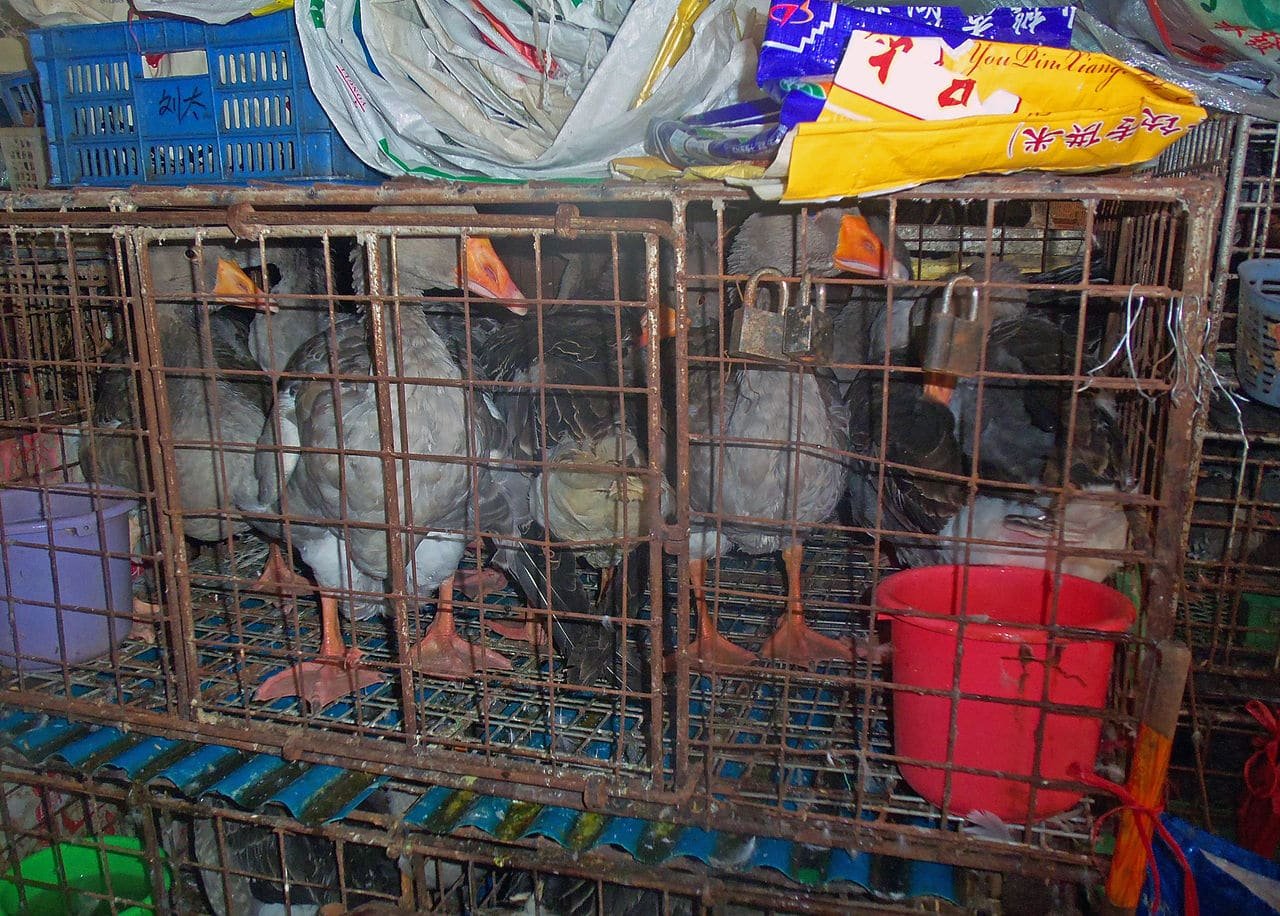Being squeamish about animal welfare is better than being squeamish about criticising China over their wet markets, which many Chinese people oppose too.
The first time I went to work in China was in 2012 right after I’d finished university. Infused with a zeal for adventure, I’d decided to take a teaching job in the remote city of Longyan in the southeast of the country. After an 11-hour flight I landed in the bustling port city of Xiamen where I met my Chinese fixer, Tam. Keen to show me that China was foreigner-friendly, he took me to Starbucks for a breakfast of coffee and croissants before embarking on a slow provincial train which took us into the depths of Fujian’s rural hinterland. As we passed endless paddy fields and bamboo forests, I couldn’t help feeling as though I’d staked out my place as a daredevil traveller, venturing to a part of the country few other foreigners would dare travel to. On the way, Tam told me that I was only one of three expats in Longyan, a city of 3 million people that few in the West, let alone China, will have heard of.
Soon after arriving, I quickly realised that Longyan was a far cry from Xiamen with its gleaming skyscrapers and American-style shopping malls. Women in conical rice hats hawked vegetables by the roadside while men made hand-pulled noodles in makeshift shacks. As we took a cab to my apartment, I was by the masses of people thronging down some dark and uninviting-looking alleyways. “Where are they going?”, I asked Tam. “To the wet markets. That’s where poor people go to shop. You shouldn’t go there.” Incorrigible contrarian that I am with a proclivity for the darker side of travel, I made it my mission to visit all the places my fixer advised me to steer clear of. Having been treated to a lavish welcome dinner by the headteacher of my school who was thrilled to have finally met a native English speaker in the flesh, I decided to beat my lingering jet lag by doing a bit of exploring around the city.
Much of what I initially saw conformed to my preconceived ideas of what China was like. At the nearby temple, families made offerings of food to Guan Yin, goddess of mercy and compassion, while teenagers lit joss sticks and prayed for good fortune in their upcoming college-entry exams. I sat and stared in awe as an elderly man with a long, wispy beard practiced tai chi in the park, evincing the nimbleness of someone half his age. This initial honeymoon phase was abruptly ended however when a women, not older than 40, hocked up a nice big loogie right by my foot. Soon enough, I started noticing how commonplace spitting in China actually is, even despite government efforts to discourage it on the basis that it spreads diseases like tuberculosis. This revolting habit was encouraged by none other than Mao himself as a way of maintaining good bronchial health. Now it’s so ingrained, particularly in the older generation, that it’s difficult for many Chinese to stop.
Later, I headed into the city’s old town in the hopes of finding “the real China”. Every so often I’d pass entries to small courtyards where fresh produce was being sold, often by migrants from the surrounding countryside. These were the so-called “wet markets” that Tam had warned me about earlier. Still fortified by wanderlust, I ignored Tam’s advice and entered what looked like a meat and fish market. The smell of death emanating from its vast interior was forbidding alone but what I was to find there was even worse. In the fish section, tough-looking women in blood-spattered yellow aprons dispatched toads with sinister-looking meat cleavers. The guts were tossed into a filthy bucket encircled by flies. Notions of hygiene were conspicuously absent apart from the odd perfunctory hosing down of the chopping board. In the meat section, chunks of flesh sat exposed to the elements on grubby wooden tables. Split pig carcasses lay on blankets on the floor, many perilously close to offal-clogged drains. Pigeons, rodents, chickens, cats and dogs sat forlornly in cages awaiting their gruesome fate. I sat in horror as one vendor, a short stubby man with a cigarette hanging out of the side of his mouth, dragged a cat out its cage, slammed it onto the chopping board, cracking its neck in the process and then mercilessly cutting its throat. The screams of pain were unimaginably distressing to hear.
Later, I told Tam of what I saw. He was visibly irate that I’d gone off piste and exposed myself to such sights, but, in typically Chinese fashion, restrained his emotion and instructed me sternly to “stay away from those places. You Westerners are too sensitive to see this kind of stuff.” He was right. Us Westerners are too sensitive, perhaps to a fault. So much so that we’re detached from the brutal reality of what happens in our own slaughterhouses. But the outright callousness I’d witnessed in the wet markets was something I’d been hitherto unprepared for. I’d heard horror stories about China’s treatment of animals before and often dismissed them either as over-blown or even as borderline-racist, but having been confronted with the reality of it my feelings had changed. No longer could I accept the cultural relativism and political correctness of Western liberals who point out that eating animals we consider as pets is no different to eating cows. Upon my return to the UK a few months later, I told people of what I’d seen that day at the wet markets. Many were horrified, particularly upon mentioning that the slaughtered cat happened to have been a tabby. Despite this, I kept hearing the same culturally relativist tropes trotted out, almost as a kind of coping mechanism and a way to circumvent any tangential whiff of racism.
The real racism I’ve come to realise is not in the condemnation of these barbaric culinary practices but in the assumption that all Chinese agree with the consumption of animals that the majority of people in the Middle Kingdom consider as pets. During the infamous Yulin dog meat festival, in which both canines and felines, many stolen from family homes, are roasted, boiled, blow-torched and skinned alive for the sick amusement of revellers, hundreds of Chinese activists, many from the bigger cities, book out the local hotels in the city and bravely try to save these creatures. Last year, a Chinese rescue mission saved 62 dogs from imminent slaughter. While China remains the only major industrialised nation without animal rights legislation, grassroots animal activist groups such as Freedom for Animal Actors (FAA) are popping up all over the Mainland. Celebrities such as Yao Ming, the 7’6’’-tall basketball player, and Guo Ke, the film director, have helped to raise animal welfare consciousness in the country through their condemnation of the country’s consumption of shark fin soup and cat meat respectively.
Young people I spoke to during my second stint teaching in China, this time in Zhengzhou, a modern metropolis of 11 million in the centre of the country, overwhelmingly condemned the practice of eating dogs and cats, often citing it as cruel and reprehensible as well as an embarrassment to the Chinese people and expressing a fervent wish that their government would put an end to the practice. Although the consumption of dog meat is frowned upon in this relatively wealthy city, a few specialist restaurants can still be found, albeit off the beaten track. Even in Beijing one can find them if one looks hard enough though, thankfully, they are becoming a rarity. Perhaps within a generation or two they may even die out. What is important until that happens is that we in the West are not squeamish about criticising cultural practices that are backward and have no place in the modern world. Political correctness should never be invoked as a way of justifying the hideous cruelty that we know exists in a country which has a lot of catching up to do when it comes to the treatment of animals.








Article Discussion